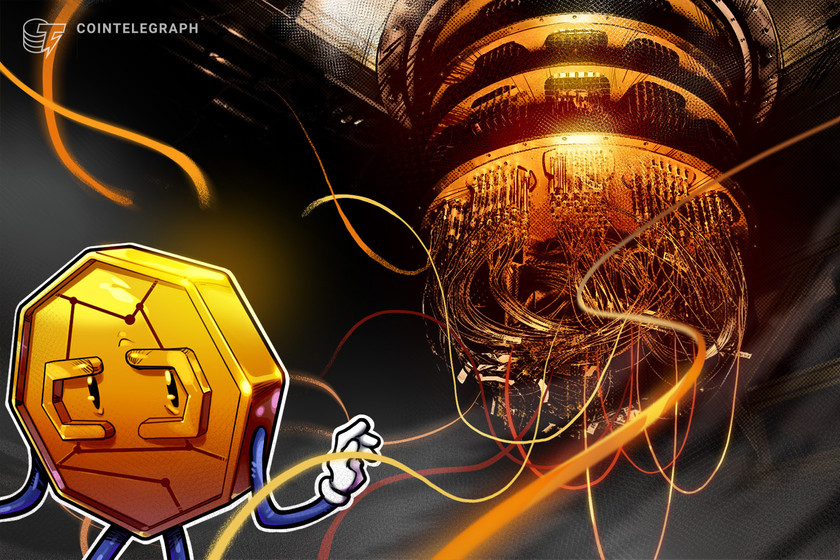
Quantum computing has raised considerations about the way forward for cryptocurrency and blockchain know-how in recent times. For instance, it's broadly believed that refined quantum computer systems will sooner or later be capable of crack immediately's encryption, making safety a severe concern for customers within the blockchain house.
The SHA-256 cryptographic protocol used for Bitcoin community safety is at the moment unbreakable by immediately's computer systems. Nevertheless, specialists anticipate that inside a decade quantum computer systems will be capable of break present encryption protocols.
Concerning whether or not holders ought to fear about quantum computing posing a menace to cryptocurrency, Johann Polecsak, chief know-how officer of the QAN platform, a Layer 1 blockchain platform, informed Cointelegraph:
"Undoubtedly. Elliptic curve signatures - which energy all main blockchains immediately and are confirmed to be weak to QC assaults - will break what's the ONLY authentication mechanism within the system. As soon as it breaks, will probably be actually unimaginable to open a authentic pockets -Distinguish proprietor from a hacker who cast a signature of it.”
If present cryptographic hashing algorithms are ever cracked, tons of of billions price of digital property stay weak to theft by malicious actors. Regardless of these considerations, nevertheless, quantum computing nonetheless has a protracted strategy to go earlier than it turns into a viable menace to blockchain know-how.
What's quantum computing?
Fashionable computer systems course of info and carry out calculations utilizing "bits". Sadly, these bits can't exist in two locations and in two totally different states on the identical time.
As a substitute, typical pc bits can have both the worth 0 or 1. A great analogy is popping a lightweight swap on or off. So, for instance, if there's a pair of bits, these bits can solely include one among 4 doable mixtures at any given time: 0-0, 0-1, 1-0, or 1-1.
From a extra pragmatic standpoint, which means a mean pc will most likely take a while to carry out sophisticated calculations, particularly ones which have to think about each doable configuration.
Quantum computer systems shouldn't have the identical limitations as typical computer systems. As a substitute, they use one thing known as quantum bits, or "qubits," as an alternative of conventional bits. These qubits can coexist in states 0 and 1 on the identical time.
As already talked about, two bits can include solely one among 4 doable mixtures on the identical time. Nevertheless, a single pair of qubits can retailer all 4 on the identical time. And with every extra qubit, the variety of doable choices grows exponentially.
Present: What the Ethereum merger means for the layer 2 options of the blockchain
Because of this, quantum computer systems can carry out many calculations whereas making an allowance for a number of totally different configurations. For instance, take into account the 54-qubit Sycamore processor developed by Google. It was capable of full a calculation in 200 seconds that will have taken the world's strongest supercomputer 10,000 years.
Merely put, quantum computer systems are a lot quicker than conventional computer systems as a result of they use qubits to carry out a number of calculations on the identical time. Additionally, as a result of qubits can have a price of 0, 1, or each, they're much extra environment friendly than the binary bit system utilized by present computer systems.
Various kinds of quantum computing assaults
In so-called reminiscence assaults, a malicious get together makes an attempt to steal money by concentrating on weak blockchain addresses, e.g. B. these the place the general public key of the pockets is seen in a public ledger.
4 million bitcoin (BTC), or 25% of all BTC, are weak to an assault by a quantum pc as a result of the house owners use unhashed public keys or reuse BTC addresses. The quantum pc must be highly effective sufficient to decrypt the non-public key from the unhashed public handle. If the non-public key's efficiently decrypted, the malicious actor can steal a person's funds proper from their pockets.
Nevertheless, specialists estimate that the computing energy required for these assaults could be tens of millions of occasions better than present quantum computer systems, which have fewer than 100 qubits. Nonetheless, researchers within the area of quantum computing have hypothesized that the variety of qubits used could also be growing reach 10 million within the subsequent ten years.
To guard towards these assaults, crypto customers should keep away from reusing addresses or transferring their funds to addresses the place the general public key has not been made public. This sounds good in principle, however can show to be too tedious for on a regular basis customers.
Somebody with entry to a strong quantum pc might try and steal cash from a blockchain transaction in transit by launching a transit assault. Since this is applicable to all transactions, the scope of this assault is far bigger. Nevertheless, it's harder to execute as a result of the attacker should full it earlier than the miners can execute the transaction.
Normally, an attacker has no various minutes as a result of affirmation time on networks like Bitcoin and Ethereum. Hackers additionally want billions of qubits to carry out such an assault, making the chance of a transit assault a lot decrease than a reminiscence assault. Nonetheless, customers ought to nonetheless maintain this in thoughts.
Defending towards assaults throughout transport isn't a simple process. To do that, it's essential to modify the underlying cryptographic signature algorithm of the blockchain to 1 that's proof against a quantum assault.
Measures to guard towards quantum computing
There's nonetheless so much to do with quantum computing earlier than it may be thought-about a reputable menace to blockchain know-how.
Moreover, blockchain know-how will most definitely evolve to deal with the difficulty of quantum safety till quantum computing turns into broadly out there. There are already cryptocurrencies like IOTA that use Directed Acyclic Graph (DAG) know-how, which is alleged to be quantum resistant. Not like the blocks that make up a blockchain, directed acyclic graphs are made up of nodes and connections between them. Thus, the information of crypto transactions take the type of nodes. Then the information of those exchanges are stacked on high of one another.
Block lattice is one other DAG-based know-how that's quantum resistant. Blockchain networks just like the QAN platform use the know-how to allow builders to create quantum-resistant good contracts, decentralized functions, and digital property. Lattice cryptography is proof against quantum computing as a result of it depends on an issue {that a} quantum pc could not be capable of simply remedy. That Surname This drawback is expounded to the shortest vector drawback (SVP). Mathematically, the SVP is a query of discovering the shortest vector in a high-dimensional lattice.
Just lately: ETH Merge will change the way in which corporations view Ethereum for enterprise
The SVP is believed to be troublesome to resolve for quantum computer systems as a result of nature of quantum computing. Solely when the states of the qubits are absolutely aligned can the superposition precept be utilized by a quantum pc. The quantum pc can use the superposition precept when the states of the qubits are completely matched. Nevertheless, it should resort to extra typical calculation strategies when the states are usually not. Because of this, a quantum pc could be very unlikely to have the ability to remedy the SVP. Due to this fact, lattice-based encryption is safe towards quantum computer systems.
Even conventional organizations have taken steps towards quantum safety. JPMorgan and Toshiba have teamed as much as develop Quantum Key Distribution (QKD), an answer they declare is quantum-resistant. By using quantum physics and cryptography, QKD permits two events to trade delicate information whereas concurrently figuring out and thwarting any try by a 3rd get together to snoop on the transaction. The idea is seen as a doubtlessly helpful safety mechanism towards hypothetical blockchain assaults that quantum computer systems might carry out sooner or later.





